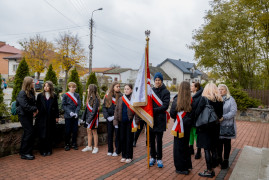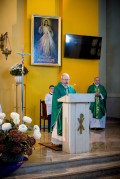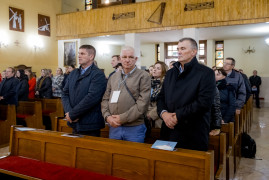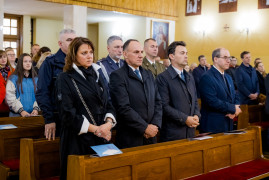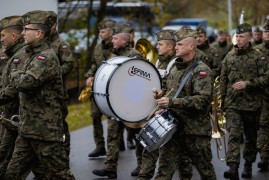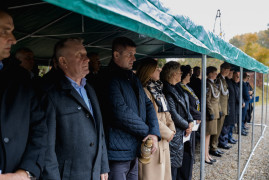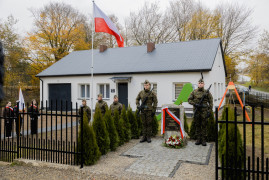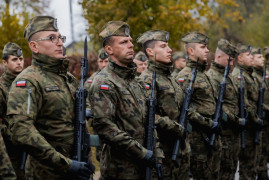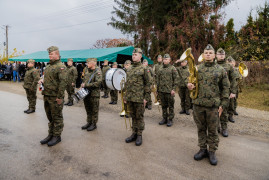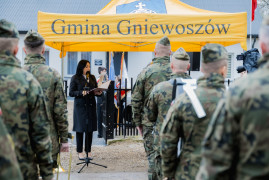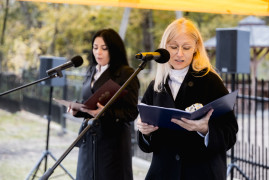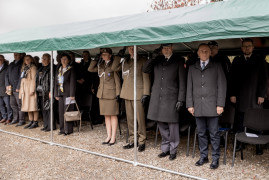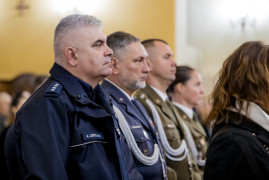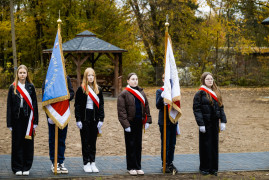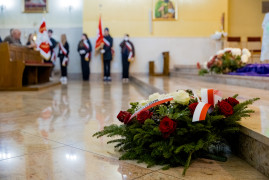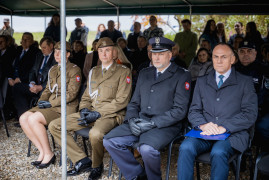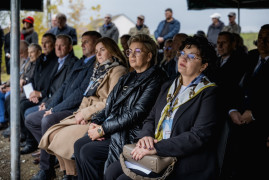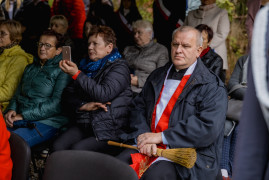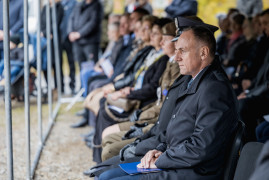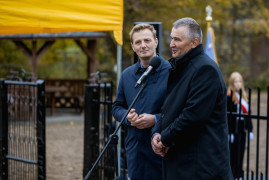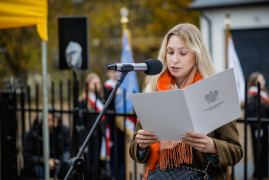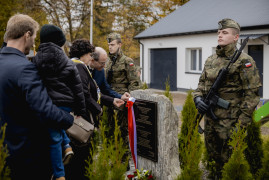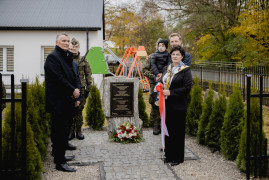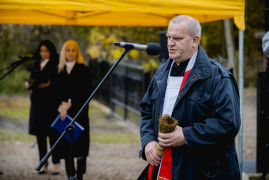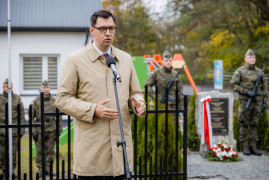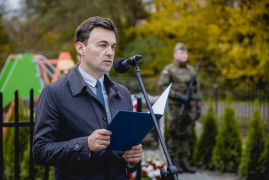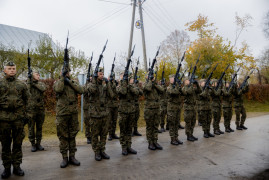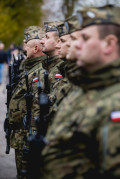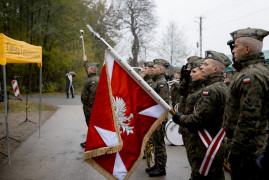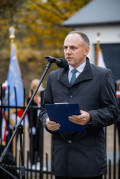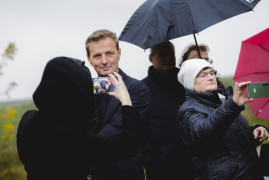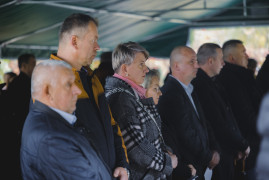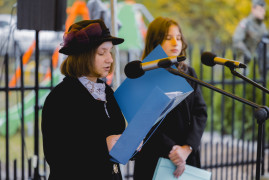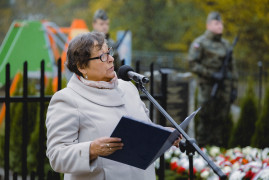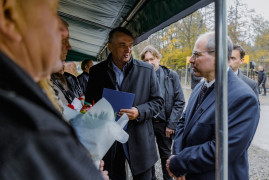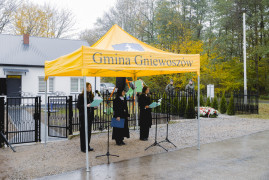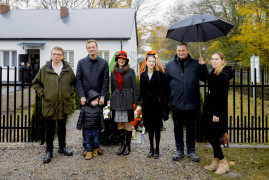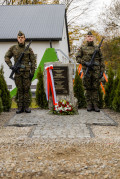The commemoration of Józef Suchecki and Jan Wolski, who were murdered for helping Jews during the German occupation | Called by Name - Instytut Pileckiego
The commemoration of Józef Suchecki and Jan Wolski, who were murdered for helping Jews during the German occupation | Called by Name
On 29 October 2024 in Zwola (Kozienice District, Gniewoszów Commune), the Pilecki Institute commemorated Józef Suchecki and Jan Wolski, who were murdered for helping Jews during the German occupation.
The ceremony began with a mass at the Church of the Immaculate Heart of Mary in Gniewoszów. Next, a stone with a commemorative plaque was unveiled in front of the village hall in Zwola.
The ceremony was attended among others by Dr. Wojciech Kozłowski, Acting Director of the Pilecki Institute; MP Konrad Frysztak; Krzysztof Wolski, Starost of Kozienice; Marcin Gac, Head of the Gniewoszów Commune, as well as descendants of the murdered. Ms. Anna Kwiecień-Klimek read out a letter from Senator Stanisław Karczewski.
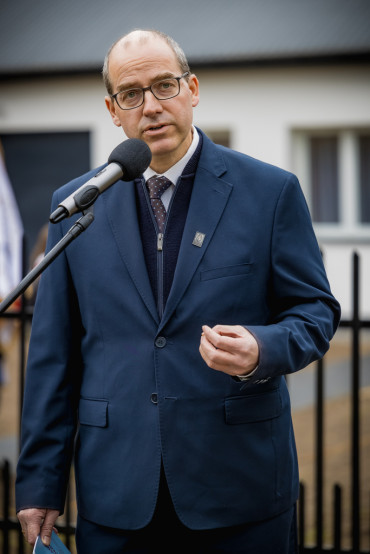
Andrzej Suchecki and Robert Adach, the grandson and great-grandson of Józef Suchecki, spoke on behalf of the families of the commemorated.
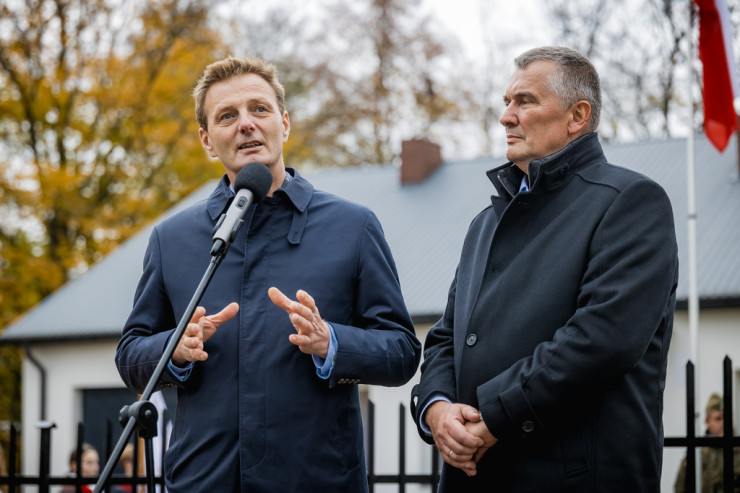
At times when it is punishable by death, kindness becomes a miracle, said Robert Adach, great-grandson of Józef Suchecki, at the beginning of his speech. We heard this story from our grandmothers. It was a family story of how our grandfather was shot in front of our grandmother for helping Jews […]. Without the work of historians, this heroic deed would have survived in our family for one or two more generations, and then it would have been lost to oblivion. The miracle we are talking about would have been lost without giving us a chance to reflect that there actually were Poles who – risking their own lives – did not hesitate to help Jews […]. These simple people who lived not far from the ghetto surely did know that they were risking their lives by helping Jews, said the great-grandson of Józef Suchecki.
These tragic events unfolded in our commune, said Marcin Gac, Head of the Gniewoszów Commune. We who live here today have to pass on the history of those years and those people to the younger generations. I am proud that such people lived here in our land.
Poles are truly self-sacrificing when others are in danger, when the lives of others are in danger, said MP Konrad Frysztak. We demonstrated that also a few years back, when the full-scale war in Ukraine caused many Ukrainians to seek shelter abroad.
This was the 38th commemoration as part of the “Called by Name” program. So far, including the commemorated from Zwola, the Pilecki Institute has “called by name” 99 Poles who were murdered for assisting Jews during the German occupation.
The story of Józef Suchecki and Jan Wolski
Until the outbreak of the Second World War, Jews accounted for more than 60% of the residents of Gniewoszów. After the General Government was established, German authorities set up a ghetto in Gniewoszów in 1940. All Jews from the area were resettled there, and in August 1942 the number of ghetto inhabitants reached 6,850 people. Appalling sanitary and humanitarian conditions translated into high mortality rates. Between August and November 1942, the Germans liquidated the ghetto by gradual displacement of its residents, who were deported among others to the death camp at Treblinka.
Those who managed to escape, some with the help of Poles, sought shelter with local farmers whom they already knew, among others with Józef Suchecki and his neighbor Jan Wolski from Zwola. Both men were poor, and their small farms had to feed large families: Józef and his wife Józefa had eight children, while Jan and his wife Helena had five.
At the dawn of 17 August 1943, probably following a denunciation by German colonists from the nearby settlement of Marianów, a group of German gendarmes from the Zwoleń station arrived in Zwola. The Germans first entered the farm of the Wolski family, and then stormed into the Suchecki household. While searching the buildings, the gendarmes beat up the residents, including the children. Jan Wolski and Józef Suchecki were taken to the neighboring Gąsior farm. Wolski was shot when he attempted to escape during a brutal interrogation concerning the hiding place of the Jews. The Germans ordered Suchecki to dig a pit on the spot where Wolski had fallen, and then proceeded to shoot him. Next they ordered that Suchecki and Wolski be buried in the same pit.
After the war, the bodies of the murdered were exhumed and moved to the parish cemetery in Oleksów. The gendarmes did not find any Jews on Wolski and Suchecki’s properties, but they probably discovered some traces of their having stayed there. It is likely that such traces were not discovered in the buildings of Adam Gąsior, as he was spared his life. After the crime the gendarmes looted the Suchecki farm. In the meantime, the Germans caught a group of Jews from Gniewoszów, who had gone into hiding. Among the detained were Elizer Finkelman, Hersz Liebhaber, Mosze Holtzhandler, Mirl Reikh and Pesach Tanenboim. They were shot at the cemetery in Granica and buried in a mass grave. Bolesław Paciorek, who in 2017 was named Righteous Among the Nations for helping Jews from the Gniewoszów ghetto, confirmed in his testimony that the execution was closely linked to the murder of two farmers on 17 August 1943 in Zwola. Therefore, it is highly probable that the above named Jews were among those who received help from Józef Suchecki and Jan Wolski.
The sheltering of Jews began around 1942. Jan Wolski prepared a hideout in the attic of his barn, and Józef Suchecki also chose his own store for a hiding place. About a dozen Jews would hide at their place, including entire families. There was frequent rotation; some would leave and others would come to take their place. I knew most of these Jews – before the war broke out in 1939 I had often seen them both in Gniewoszów and in our village, where they would come as tradesmen and craftsmen, as one of the village residents, Władysław Bąk, testified many years later.
In all probability Adam Gąsior, who lived nearby, also provided Jews with shelter or other forms of assistance. For safety reasons, the Jews would stay in the buildings or their hideouts during the day and leave only at night. It was solely under the cover of darkness that they could take a breath of fresh air, wash themselves and eat, or – should circumstances so require – move to another farm. Small groups of fugitives would often change their places of stay to avoid detection. A particular threat was posed by German colonists living in the area, as they kept a wary eye on Polish farmsteads, watching out for any unusual movements or the barking of dogs.
My father sheltered about a dozen Jews and a woman with her family from spring 1943 to August 1943 […]. He was denounced by German farmers who had settled in our lands. I know that one of the men who denounced my father was called Poll Otek. I do not know what happened to him later. I do not know the surnames, ages or places of origin of the Jews who were sheltered by my father. The Jews sheltered by my father managed to escape, but I do not know their subsequent fates, testified Janina Giza, the oldest daughter of Józef Suchecki.
The “Called by Name” program is dedicated to Polish nationals who were murdered for helping Jews during the German occupation. Their memory is cherished in their families, yet these stories remain largely unknown to the general public. The program was created out of the need to mark the sites connected with the murdered victims in the public space. At each site, a stone is erected bearing a commemorative plaque with the names of the murdered Poles and the murdered people whom they were helping (if their names are known). The commemoration ceremonies are preceded with educational workshops in the local schools, which are conducted by skilled educators and historians. The Pilecki Institute strives to make these local experiences part of the universal historical awareness. The descendants and relatives of the murdered victims create a community of the Families of the Called by Name, meeting regularly to exchange experiences and standardize promotional activities. With the same aim, the program brings together and offers support to representatives of the local government. Among the partners of the program are more than 78 local government units as well as educational and cultural institutions. More (click here).
